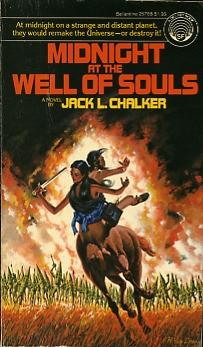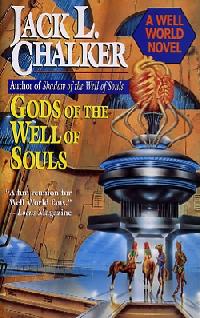Nathan Brazil and Marva Chang
Human remnants at the Well of Souls
By William Wetherall
First posted 6 January 2006
Last updated 10 January 2006
Jack L. Chalker Jack L. Chalker Jack L. Chalker Jack L. Chalker From blurb on back cover of origina Del Rey edition of Midnight at the Well of Souls.
Jack Chalker's "Midnight at the Well of Souls" is a science fiction adventure tale that one could describe as an ambitious epic, yet written with an often whimsical sense of fun. The novel is full of colorful characters, weird locales, and imaginatively conceived alien species. The story's hero is freighter captain Nathan Brazil, a human male who is noted to be a maverick and a loner in "an age of extreme conformity." While carrying a motley collection of passengers on his ship, Brazil answers a distress call. Soon he finds himself on the Well World, a bizarre planet divided up into hundreds of biospheres and home to hundreds of different civilizations. Oh, and each newcomer to the planet can expect to find him- or herself transformed into a different species! "Midnight" charts the odyssey of Brazil, his allies, and his enemies across this strange and wondrous world as they seek the answer to an ancient mystery. "Midnight" is a novel of ideas as well as a fun and exciting adventure; Chalker deals with such issues as history, drug addiction, crime, social organization, literacy, and more as the story unfolds. Chalker cleverly delves into the life cycles and sexual behaviors of the various Well World species, which include intelligent plants, a centaur-like race, and many more. The motif of transformation, including gender-changing, is intriguingly handled throughout the story.
Chalker makes reference to "Alice in Wonderland" at one point in the book, but the book, curiously, reminds me more of L. Frank Baum's classic Oz tales. And Chalker's vision of science, civilization, and history reminds me a bit of a less horrific, more light-hearted H.P. Lovecraft. Overall, a lot of fun, and written in a very engaging prose style. If you like this book, try "Lord Valentine's Castle," by Robert Silverberg. To be continued. |



